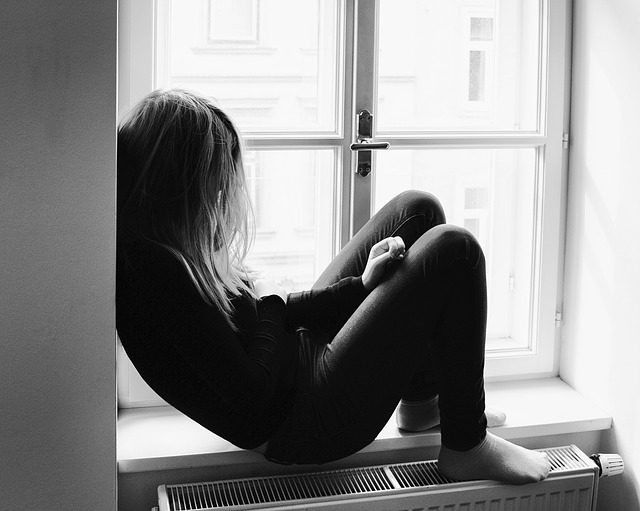
I read an article in The Mighty the other day that made me so sad– and, at the same time, so relieved that other people had been through the same thing, so relived it wasn’t just me. Kelsey Heythere writes about having Inflammatory Bowel Disease and how it eventually makes friends and family leave you. She writes about pacing around the hospital having panic attacks, crying that she wanted her mother, but her mother left. All her friends left. They went on with their lives and they didn’t come back.
At first, friends visited. They suited up in yellow isolation gowns and nitrile gloves so they could be in the same room as me at 21. I was living, breathing proof that not all 20-somethings were invincible. Then, during my second long-term stay, I had a panic attack in front of my two close friends while they were visiting. They left the hospital crying. That was the last time they visited. There was a certain look in the eyes of a friend who would not be returning to the hospital, who would not be likely of returning to your life, after all this was over. An absent but sympathetic look that acknowledged saying goodbye would be too painful.
I know that look so well.
The abandonment that comes with living with a chronic illness is something that needs to be talked about more often. When you’re sick, people disappear.
I don’t have IBD like that author does. I went through 24 months where I had several medical emergencies: first a burst appendix, then a bowel obstruction from a cecal volvulus, and then after that my gall bladder gave out. Dead bowel, tubes up the nose, scars, staples, adhesions, the slow healing process, and things just kept going wrong.
After that, as often happens when a person has had a lot of surgeries in a row, my nervous system began to fail. I started going to doctors when the fatigue and dizziness got crippling, to say nothing of the nerve pain and anxiety. They tested me for everything under the sun– vial after vial of blood, trip after trip to the friendly phlebotomist who said “that’s why I like butterflies!” but didn’t mean the insect. Nothing showed up as abnormal, which meant I had fibromyalgia, “a diagnosis of exclusion.” There are treatments for the pain of fibromyalgia, and I have taken prescription painkillers when the pain got severe. But the pain is only here on and off– indeed it’s usually less trouble than the side effects of pain medication, in itself. Anxiety crops up from time to time, and anxiety can be treated by a doctor to some extent, but the anxiety is only here on and off. There are treatments for what it does to your digestion– one year I had such severe acute gastritis I honestly thought I was dying. I got the scope from the GI, and pills for the acid, and I didn’t eat any spicy food or drink anything carbonated for six months, and eventually it went away where it came from.
The fatigue is a much worse struggle. There’s no medical treatment for fatigue. I wish to God there was. Fatigue comes and goes in waves and can knock me flat for a month. Oftentimes I can be out and about running errands for an hour or two a day, I can take my walks downtown and go to the Adoration chapel. If the weather is good and I’ve rested up for awhile, I can spend a day taking my daughter to the carnival or something like that. Quite a few times, lately, I’ve felt perfectly normal all day long, for days at a stretch. I have found a certain diet, an exercise routine, and some expensive herbal remedies that help manage the fatigue considerably. And then I crash again and I can’t leave the house for a week, ten days, a month. I’ve found ways to cope with days that I have fatigue– turn all the housework over to Michael, park myself on the sofa or in bed with the electric fan blowing, don’t move very much, try to clear my head to write, don’t try to force clarity or the fog will get worse, peppermint oil, coffee. But it’s still here.
Fibromyalgia is always here.
This makes people angry. I’ve written about this before. Something no one will tell you about chronic illness until you have one, is that it makes people very angry with you. It makes them scared and frustrated, because you’re not doing what you’re supposed to do. People who get sick are either supposed to get better, or they’re supposed to die. The finality of death is something they can understand. The hopefulness of a good patient following orders and getting better is something they can understand. The enigma of a person who is sick all the time, or sick most of the time with random runs of good days, or who “doesn’t look sick” and keeps coming down with things anyway, is not something they can fathom, and it scares them. So they tell you “go to the doctor” even though you’re going to several doctors. They tell you you don’t need your diet and natural treatments and that you just need a doctor– or else, they tell you you need to stop seeing the doctor and take a bunch of herbs and go on a diet. And when you tell them you’re doing plenty of both, thousands of hours and dollars of both, they don’t believe you. They tell you to your face that you’re a burden, a grifter, not trying hard enough, that you make them feel guilty,that you suck the life out of them. They tell you it’s nothing personal. Or else they say nothing at all.
They disappear.
They go and live their lives, a nine to five, several children, hobbies, friendships,whatever it is healthy people do, and they leave you. They leave you in the hospital or at home, they stop calling or answering calls, they post fun photos on facebook of the things they did with the other people that used to be in your social circle. They disappear.
This is a Catholic blog and this is the place where I’m supposed to talk about how Catholics are living the Gospel, but those of you who are familiar with my work know that’s not what I’m going to say. I’ll be perfectly honest as usual: the difference between Catholics and non-Catholics is that Catholics hurt worse when they insult you and disappear.
The pious woman who came to visit me in the hospital and said “You need to pray and find out why you keep going to the hospital all the time.”
The pious man who told me I was doing this for attention.
The communities who adopted us and showered us with love for a short time, and then said not to come back.
The priest who was furious with me for having dizzy spells during his Mass and needing an ice pack when the air conditioning gave out. Who backed me into a corner at the doughnut social to tell me the other parishioners were “shocked at your behavior.”
I can’t remember the last time we’ve have friends over, or been invited to anything social. I don’t even remember the last time somebody called.
I shouldn’t be so morose about this, and I’m sorry. I do have a lot to be grateful for. But this past month I’ve been having a flare– a lot milder flare than my usual summer flare, thanks to all the care I’ve taken and plain old good luck, but it’s still here. And I can’t leave the house very often, and the missed errands are piling up, and then I got a particularly trollish comment on my monthly sharing of the tip jar that I deleted and nearly cried over. It’s not a very good day. That’s why this is on my mind.
I love to read the Gospel stories about Christ being moved with compassion at the sight of a great crowd bringing Him sick people. It’s not even so much that He healed them– though I believe that He did, and I believe that He still does, and I pray every day for that. But before He healed them, when He saw that huge crowd of sick and suffering people, despised people, people who had gone to the doctor and gotten no relief, He was moved with compassion.
I love that phrase. “And He was moved with compassion.”
And He did not abandon. He did not leave. He went the opposite direction that everyone else goes. He went to them. He touched them– such a horror, to touch sick people over and over and over again. He spoke to them. He told them audacious things like “courage, child, your sins are forgiven” or “neither this man nor his parents sinned.” He defied at every turn the notion that sick people are sick because they earned it– that this is a punishment, that this is a curse people can avoid by being good in just the right way. And this made the good people who weren’t sick or unfortunate hate Him, and plot ways to kill Him.
He took their sickness to Himself– He healed the leper, who spread word of Him all over the region until He could not enter any city for the crowds, so now the leper was clean and Christ Himself was trapped outside like a leper.
He was taken prisoner, and all His friends ran away just as they do from me. He was scourged until there wasn’t a single part of His Body that was not in pain, He was stretched out helpless, humiliated, reviled, and then He lingered for hours, neither dying nor getting better like a good person should. They screamed at Him to just get better already, to come down from His cross if He was really the Son of God, but He didn’t.
He is the Sign that one can be completely innocent, without sin from the beginning, and do all the right things, and still be in pain, and still be helpless, and still be abandoned.
That is the other thing that nobody told me about chronic illness: that Christ is not only with me, He became me, one with me, suffering with me. And if you are chronically ill, He is one with you too.
I’m sure that’s not what you feel you need right now, but I hope it’s something.
(image via Pixabay)













